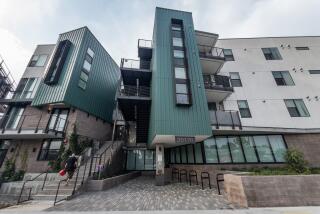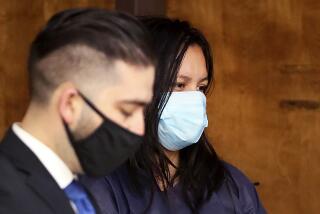Georgia Widow Charged With Murder in Deaths of Ailing Sons
- Share via
GRIFFIN, Ga. — Despite community pleas for mercy, a Georgia grand jury handed up murder charges Friday against a woman who fatally shot two adult sons as they lay in a nursing home in advanced stages of Huntington’s disease.
Carol Carr, 63, faces the possibility of life in prison if she is convicted of the killings, which friends insist she carried out in a desperate bid to end her sons’ suffering. The case has generated nationwide attention, winning Carr expressions of support from those who know the ravages of Huntington’s, a hereditary brain disorder that leaves patients unable to walk, speak or think clearly and is ultimately fatal.
Carr’s husband died of Huntington’s and a third son, James Scott, 38, in is the early stages of the disease. The disorder also struck the husband’s mother, along with a sister and brother.
James Scott labeled the indictments “the wrong decision.”
“I figured they should have dropped all the charges and let her go. She’s been in prison since 1958--taking care of someone with Huntington’s,” he said, referring to the year his parents married and his grandmother became ill.
He said he had spoken to his mother by phone and that she was “pretty upset.”
Carr’s son Randy Scott was 42 at the time of the shooting. The other son, Andy Scott, was 41.
As the indictments were read in a Spalding County courtroom 40 miles south of Atlanta, Carr remained in the county jail where she has been held without bail since her arrest June 8. Her attorneys said the law gave the grand jury scant leeway in deciding whether evidence was sufficient to charge Carr. Georgia does not have an assisted-suicide law.
The charges included murder with malice aforethought and murder in the commission of a felony.
“This is not a total surprise. We had hoped the grand jury would do away with [the case]. There were a lot of people that were hoping that,” defense lawyer Eric Hearn said.
More than a dozen Carr supporters, holding signs urging that she be freed, had gathered outside the courthouse a day earlier as the grand jury began hearing evidence behind closed doors. None of the demonstrators remained Friday, though.
Spalding County Dist. Atty. William T. McBroom declined to comment on the indictments. A court date has not been set.
Hearn expressed confidence that jurors considering the case would find Carr’s motivations compelling.
“There are circumstances here that all of us as people and compassionate people can understand and relate to, although the situation is so horrendous that I doubt there are many who can relate to that,” he said.
Lawyers cannot present a defense during grand jury proceedings, but Hearn said McBroom allowed the panel to watch an informational video about Huntington’s disease.
After her husband’s death in 1995, Carr turned her energies to caring for Randy and Andy, then in their 30s and already in the disease’s advanced stages. They needed help for the most basic tasks, such as eating and going to the bathroom. The sons eventually were placed in a Griffin nursing home, SunBridge Care and Rehabilitation, where they shared a room.
On June 8, Carr carried a .25-caliber pistol into the room and shot her sons in the head. She then walked to the lobby and awaited police.
Supporters said Carr could not stand to see her children endure more. She told one friend after the shooting that Andy was writhing and tearfully tugging at his sheets when Carr entered the room that day.
The Huntington’s Disease Society of America expressed sympathy after the shootings, noting that “our HD families and friends can well understand the enormous emotional trauma Carol Carr felt as she watched her sons follow the same path that her husband had endured so many years earlier.”
More to Read
Sign up for Essential California
The most important California stories and recommendations in your inbox every morning.
You may occasionally receive promotional content from the Los Angeles Times.












